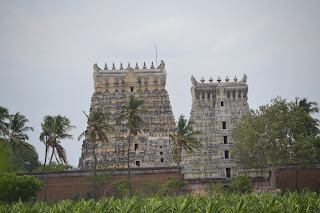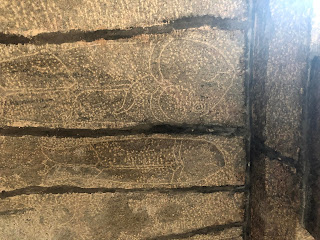This temple is very ancient and its origins are unclear. Some evidence suggests that it was here in some form in Sangam times. The Pandians built it into a stone temple in the 8th and 9th centuries and the Cholans renovated it in the 10th. As it is wedged between two hillsides, with a waterfall on one side, it has had no room to expand. So it is constrained to being a large but not huge temple as it should have been, given its long history and importance. The Nayakkans had no room to build a large rajagopuram which would have looked somewhat incongruous. The prakarams are in the shape of a conch (சங்கு) - very unique. There are hundreds of inscriptions.
It is a Paadal Petra Sthalam. Sampanthar composed the Pathikam. It is one of the Pancha Sabais - the 5 halls where Lord Nataraja performed the cosmic dance. This is the Chitra Sabai (சித்திர சபை) - the Hall of Paintings.
It is located 67 km or about 2 hours northwest off Thirunelveli and very close to Thenkasi. It is a very popular pilgrimage site and the falls are a major attraction, making it a very crowded and congested place with hundreds of vendors. This of course leads to litter. The temple itself is very clean but a lot of people come in after a dip at the falls with dripping clothes, giving the whole place a somewhat messy look.
One important thing to remember is that the Chitra Saba is not located inside the temple as you might expect. It is about a 15 minute walk away up the hill. As you exit the temple , you have to turn left and go up a series of steps and cross the street (you can drive up there). The Chitra Saba is one of the best kept secrets, not widely advertised and not to be missed. It is a whole temple made up of mural paintings. All the deities are there in the right order and system but are in the form of paintings instead of idols. The current paintings are from the Nayakkan era and are more than 500 years old. They have been painstakingly restored using the same natural herbs under the watchful eyes of INTACH (Indian National Trust for Art and Cultural Heritage). Some art historians are still not happy with the authenticity of the restoration but it is a fantastic achievement. We were spellbound. They will ask you how you found out about it and tell you that you came there because you were blessed. Photography is prohibited and strictly enforced. So we have no pictures to show you.





























































